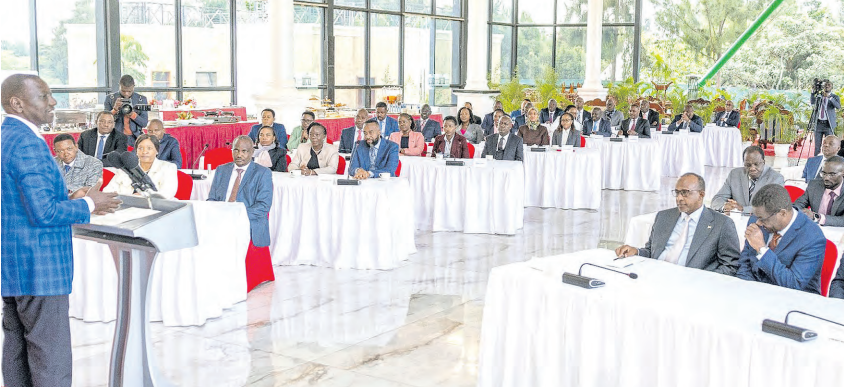

President William Ruto is facing a tough balancing act to accommodate different interests as he plans a major reshuffle of principal secretaries.
The President is expected to consider many factors including rewarding loyalty, appeasing allies who played significant roles in his 2022 victory and navigating regional concerns.
Ruto, who has signalled a major shake-up in the positions of PSs through a procedural advertisement by the Public Service Commission, will also move to punish non-performance.
The President will be under pressure to ensure the nation’s face in the appointments expected early next year. This is part of his mid-term reorganisation that has all his eyes on 2027 polls.
Ruto is also confronted with the gender aspect when constituting the government with women pushing for more positions after an alleged raw deal.
The PSC has given those interested, until December to submit their applications with reports indicating State House has already signalled preferred ones to make formal applications.
Political analyst Dismus Mokua said the President will consider many interests when picking principal secretaries.
“It is a delicate balance for the President as he reconstitutes the positions of principal secretaries in his mid-term review but there is no doubt that he will look widely to blend his administration with competence and political interests,’’ he said.
Alexander Nyamboga, a political analyst, said Kenyans should expect a good number of qualified political figures to join the government.
“It is clear that going for technocrats alone does not help stabilise the government because most of them just deal with paperwork without political consideration,’’ he said.
Insiders say the president will send home more than three-quarters of the 51 PSs to align with the broad-based government. After 2022 polls, Ruto came under pressure from the opposition after forming a government that excluded most regions that did not vote for him.
Key Kenya Kwanza strongholds of Mt Kenya and Rift Valley were handed significant seats. The President named 15 PSs and seven cabinet secretaries from Mt Kenya and retained six from the former regime.
Mt Kenya contributed more than 48 per cent of Ruto’s total votes in 2022 election. Former deputy president Rigathi Gachagua, who has since been impeached over among other allegations perpetuating tribalism, then defended the government as balanced.
Ruto’s decision then to hand the region the lion’s share of government appointments was seen as a move to reward loyalty.
Prime Cabinet Secretary Musalia Mudavadi and National Assembly Speaker Moses Wetang’ula were allocated a total of 12 PS slots. The remaining 24 slots were distributed by the President across the country, but some regions still missed out.
The President allocated 15 PS slots to his Rift Valley backyard alone, causing unease as other regions cried foul for being side-lined.
Those from Rift Valley included Geoffrey Kaituko (State Department for Labour and Skills Development), Paul Ronoh (State Department for Water and Sanitation), John Ololtuaa (State Department for Tourism), Festus Ngeno (State Department for Environment) and Harry Kimutai (State Department for Livestock Development).
Others were Belio Kipsang (State Department for Basic Education), Peter Tum (State Department for Medical Services), John Kipchumba Tanui (ICT and Digital Economy), Joel Arumonyang (State Department for Public Works), Nixon Korir (State Department for Lands and Physical Planning), Korir Sing’oei (State Department for Foreign Affairs), Chris Kiptoo (The National Treasury), Julius Bitok (State Department for Citizen Services), Aurelia Rono (State Department for Parliamentary Affairs) and Julius Korir (State Department for Cabinet Affairs).
The president then also named only 12 women as PSs, triggering protests for contravening the gender rule requirement.
In 2022 opposition strongholds of Nyanza had their number of PSs reduce from five in Uhuru Kenyatta’s administration to just three amid protests from Gusii region, which was snubbed.
The planned shake-up could see the president move to calm jitters in Kisii and Nyamira counties with at least two PS slots and one more cabinet position.
Some of those who campaigned for Ruto from the Gusii region and who are said to have been tipped for PS posts include Okeng’o Nyambane who is serving as a board member of the Communication Authority.
On Thursday, former South Mugirango MP Omingo Magara called on the President to favourably consider Kisii and Nyamira counties.
“We hope the President will come up with a composition that reflects the image of the country and at least consider our two counties for two PS positions if possible,’’ he said.
After the 2022 election, impeached deputy president Rigathi Gachagua blasted the opposition for failing to invest enough shares in government arguing that regions, which backed Ruto needed to benefit first.
During retired President Uhuru Kenyatta’s regime, the two counties had a total of two PSs while in late President Mwai Kibaki’s tenure, the region had three PSs.
Raila is said to have been promised at least 10 PS slots in the expected government reorganisation
to accommodate his allies.










